有关MOOC的英文作文-中英对照
- 格式:docx
- 大小:66.79 KB
- 文档页数:9
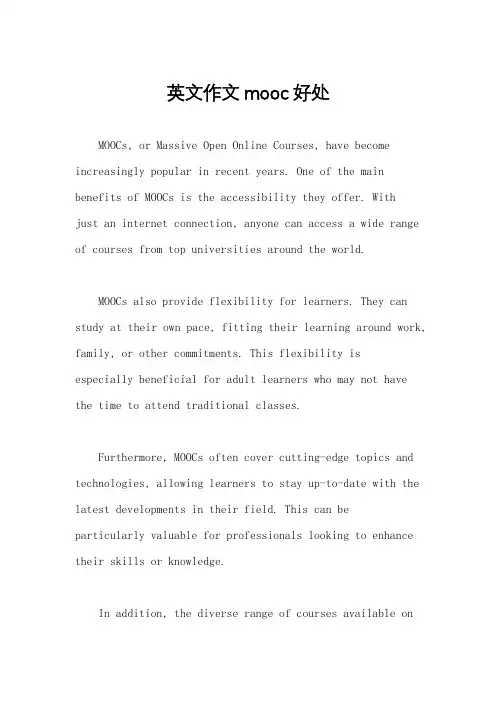
英文作文mooc好处MOOCs, or Massive Open Online Courses, have become increasingly popular in recent years. One of the main benefits of MOOCs is the accessibility they offer. Withjust an internet connection, anyone can access a wide range of courses from top universities around the world.MOOCs also provide flexibility for learners. They can study at their own pace, fitting their learning around work, family, or other commitments. This flexibility isespecially beneficial for adult learners who may not have the time to attend traditional classes.Furthermore, MOOCs often cover cutting-edge topics and technologies, allowing learners to stay up-to-date with the latest developments in their field. This can beparticularly valuable for professionals looking to enhance their skills or knowledge.In addition, the diverse range of courses available onMOOC platforms means that learners can explore new subjects and interests without committing to a full-time course. This can open up new opportunities and career paths for individuals.Another advantage of MOOCs is the opportunity to connect with a global community of learners. Through online forums and discussion groups, participants can share ideas, collaborate on projects, and learn from each other's experiences.Moreover, MOOCs are often more affordable than traditional education, making high-quality learning accessible to a wider audience. This can be especially beneficial for individuals in developing countries or those with limited financial resources.Finally, MOOCs can provide a pathway to formal education for those who may not have had access to it otherwise. Many MOOCs offer certificates or even academic credit, allowing learners to demonstrate their knowledgeand skills to potential employers or educational institutions.。
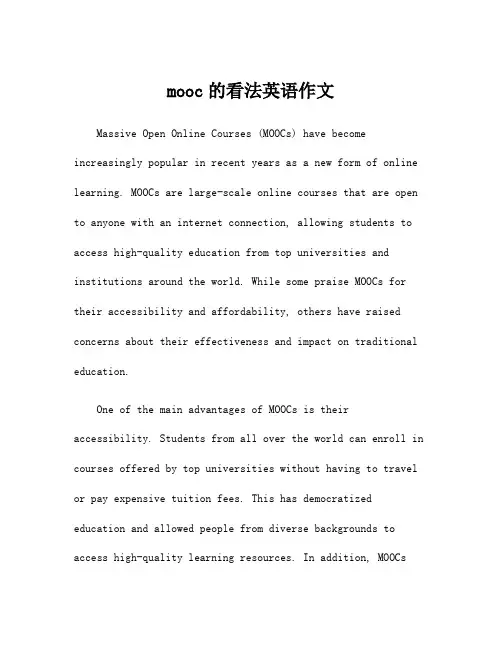
mooc的看法英语作文Massive Open Online Courses (MOOCs) have become increasingly popular in recent years as a new form of online learning. MOOCs are large-scale online courses that are open to anyone with an internet connection, allowing students to access high-quality education from top universities and institutions around the world. While some praise MOOCs for their accessibility and affordability, others have raised concerns about their effectiveness and impact on traditional education.One of the main advantages of MOOCs is their accessibility. Students from all over the world can enroll in courses offered by top universities without having to travel or pay expensive tuition fees. This has democratized education and allowed people from diverse backgrounds to access high-quality learning resources. In addition, MOOCsoffer flexibility in terms of scheduling, allowing students to learn at their own pace and balance their studies with other commitments.Another benefit of MOOCs is their affordability. Many courses are offered for free or at a low cost, making higher education more accessible to those who may not be able to afford traditional college tuition. This has the potential to reduce the financial barriers to education and increase the overall levels of knowledge and skills in society.However, there are also criticisms of MOOCs. Some argue that the lack of face-to-face interaction and personalized feedback in online courses can hinder student learning and engagement. Without the guidance of a teacher or professor, students may struggle to stay motivated and grasp complex concepts. In addition, the high dropout rates in MOOCs suggest that many students struggle to complete courseswithout the structure and support of a traditional classroom environment.Furthermore, there are concerns about the quality and accreditation of MOOCs. While some courses are taught by top professors and cover rigorous academic material, others may lack credibility and rigor. Employers and universities may not recognize MOOC certificates as equivalent to traditional degrees or qualifications, limiting the value of online courses in the job market.In conclusion, MOOCs offer an innovative and accessible form of online learning that has the potential to democratize education and increase global knowledge sharing. However, there are also challenges and limitations that must be addressed to ensure the effectiveness and credibility of online courses. As technology continues to advance and online learning becomes more mainstream, it will be important to strike a balance between the benefits and drawbacks of MOOCsin order to provide high-quality education to students around the world.。
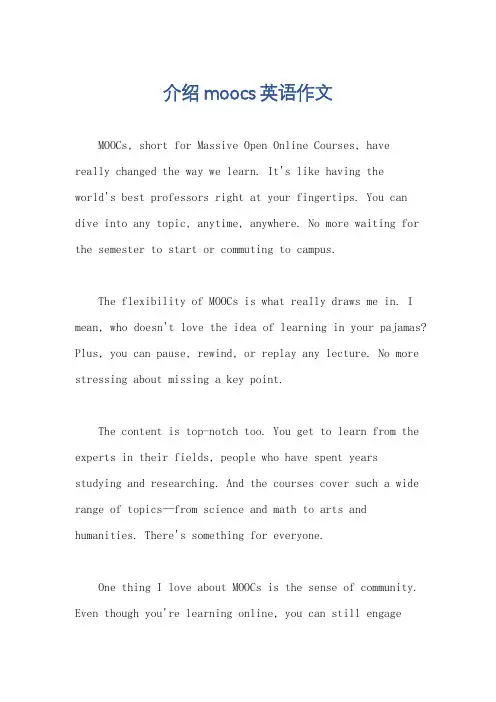
介绍moocs英语作文MOOCs, short for Massive Open Online Courses, havereally changed the way we learn. It's like having theworld's best professors right at your fingertips. You can dive into any topic, anytime, anywhere. No more waiting for the semester to start or commuting to campus.The flexibility of MOOCs is what really draws me in. I mean, who doesn't love the idea of learning in your pajamas? Plus, you can pause, rewind, or replay any lecture. No more stressing about missing a key point.The content is top-notch too. You get to learn from the experts in their fields, people who have spent years studying and researching. And the courses cover such a wide range of topics—from science and math to arts and humanities. There's something for everyone.One thing I love about MOOCs is the sense of community. Even though you're learning online, you can still engagewith other students and professors through forums and discussions. It's a great way to share ideas, ask questions, and even make new friends.But don't be fooled by the name "Massive." Just because there are thousands of students enrolled doesn't meanyou're getting a watered-down version of the course. The material is still rigorous and challenging, and you have to put in the work to succeed.Overall, MOOCs are a great way to expand your knowledge and skills. Whether you're looking to.。
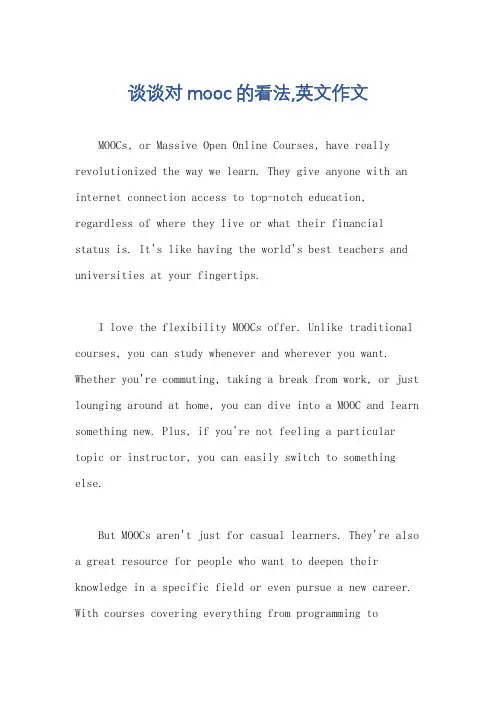
谈谈对mooc的看法,英文作文MOOCs, or Massive Open Online Courses, have really revolutionized the way we learn. They give anyone with an internet connection access to top-notch education, regardless of where they live or what their financial status is. It's like having the world's best teachers and universities at your fingertips.I love the flexibility MOOCs offer. Unlike traditional courses, you can study whenever and wherever you want. Whether you're commuting, taking a break from work, or just lounging around at home, you can dive into a MOOC and learn something new. Plus, if you're not feeling a particular topic or instructor, you can easily switch to something else.But MOOCs aren't just for casual learners. They're also a great resource for people who want to deepen their knowledge in a specific field or even pursue a new career. With courses covering everything from programming topsychology, you can really go as deep as you want into a subject.Of course, MOOCs have their challenges too. It's easy to get overwhelmed with the amount of content available, and without a structured class environment, it can be tough to stay motivated. But if you're self-disciplined and have a clear learning goal, MOOCs can be an incredibly powerful tool.Overall, I think MOOCs are a great addition to the educational landscape. They provide an accessible, flexible way to learn that fits into busy modern lives. And while they might not be perfect, they're constantly evolving and improving, making it easier for everyone to access quality education.。
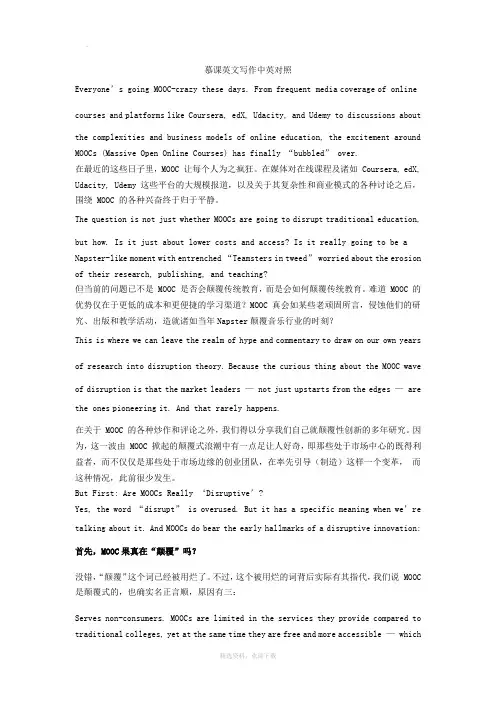
慕课英文写作中英对照Everyone’s going MOOC-crazy these days. From frequent media coverage of online courses and platforms like Coursera, edX, Udacity, and Udemy to discussions aboutthe complexities and business models of online education, the excitement around MOOCs (Massive Open Online Courses) has finally “bubbled” over.在最近的这些日子里,MOOC 让每个人为之疯狂。
在媒体对在线课程及诸如 Coursera, edX, Udacity, Udemy 这些平台的大规模报道,以及关于其复杂性和商业模式的各种讨论之后,围绕 MOOC 的各种兴奋终于归于平静。
The question is not just whether MOOCs are going to disrupt traditional education,but how. Is it just about lower costs and access? Is it really going to be a Napster-like moment with entrenched “Teamsters in tweed” worried about the erosion of their research, publishing, and teaching?但当前的问题已不是 MOOC 是否会颠覆传统教育,而是会如何颠覆传统教育。
难道 MOOC 的优势仅在于更低的成本和更便捷的学习渠道?MOOC 真会如某些老顽固所言,侵蚀他们的研究、出版和教学活动,造就诸如当年Napster颠覆音乐行业的时刻?This is where we can leave the realm of hype and commentary to draw on our own years of research into disruption theory.Because the curious thing about the MOOC wave of disruption is that the market leaders — not just upstarts from the edges — are the ones pioneering it. And that rarely happens.在关于 MOOC 的各种炒作和评论之外,我们得以分享我们自己就颠覆性创新的多年研究。
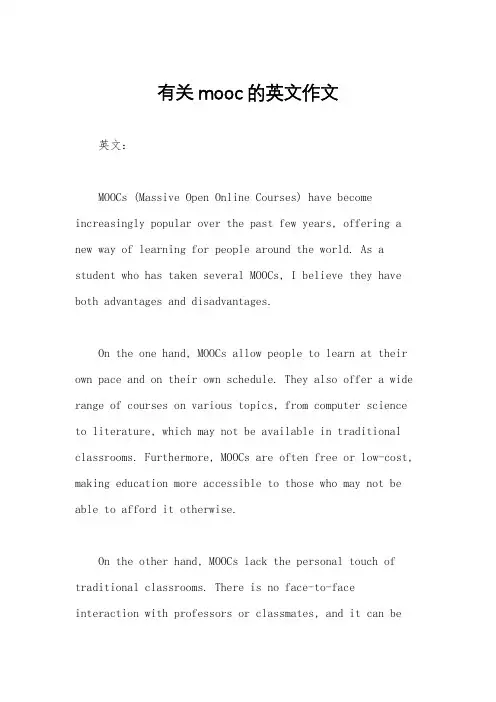
有关mooc的英文作文英文:MOOCs (Massive Open Online Courses) have become increasingly popular over the past few years, offering a new way of learning for people around the world. As a student who has taken several MOOCs, I believe they have both advantages and disadvantages.On the one hand, MOOCs allow people to learn at their own pace and on their own schedule. They also offer a wide range of courses on various topics, from computer science to literature, which may not be available in traditional classrooms. Furthermore, MOOCs are often free or low-cost, making education more accessible to those who may not be able to afford it otherwise.On the other hand, MOOCs lack the personal touch of traditional classrooms. There is no face-to-face interaction with professors or classmates, and it can bedifficult to get personalized help or feedback. Additionally, MOOCs require a lot of self-motivation and discipline, as there are no set schedules or deadlines.Overall, I think MOOCs are a valuable tool for learning, but they should not replace traditional classrooms entirely. They can be used as a supplement to traditional educationor as a way for people to learn new skills and knowledge on their own.中文:MOOC(大规模开放在线课程)在过去几年中变得越来越受欢迎,为全世界的人们提供了一种新的学习方式。
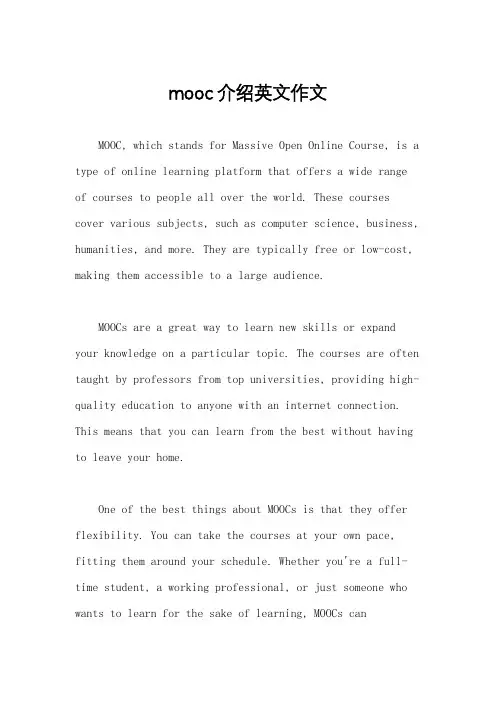
mooc介绍英文作文MOOC, which stands for Massive Open Online Course, is a type of online learning platform that offers a wide range of courses to people all over the world. These courses cover various subjects, such as computer science, business, humanities, and more. They are typically free or low-cost, making them accessible to a large audience.MOOCs are a great way to learn new skills or expand your knowledge on a particular topic. The courses are often taught by professors from top universities, providing high-quality education to anyone with an internet connection. This means that you can learn from the best without having to leave your home.One of the best things about MOOCs is that they offer flexibility. You can take the courses at your own pace, fitting them around your schedule. Whether you're a full-time student, a working professional, or just someone who wants to learn for the sake of learning, MOOCs canaccommodate your needs.Another benefit of MOOCs is the opportunity to connect with people from all over the world who share your interests. Many courses include discussion forums where you can interact with other students, ask questions, and exchange ideas. This global community can provide valuable insights and perspectives that you might not get in a traditional classroom setting.MOOCs also provide a way for people to gain new credentials or certifications that can help them advance in their careers. Many courses offer the option to earn a certificate upon completion, which can be a valuable addition to your resume. This can be especially beneficial for those who are looking to switch careers or demonstrate their expertise in a particular area.In conclusion, MOOCs have revolutionized the way we learn, offering a convenient, affordable, and diverse range of courses to people around the world. Whether you're looking to gain new skills, connect with others, or advanceyour career, MOOCs provide a valuable opportunity for personal and professional growth.。
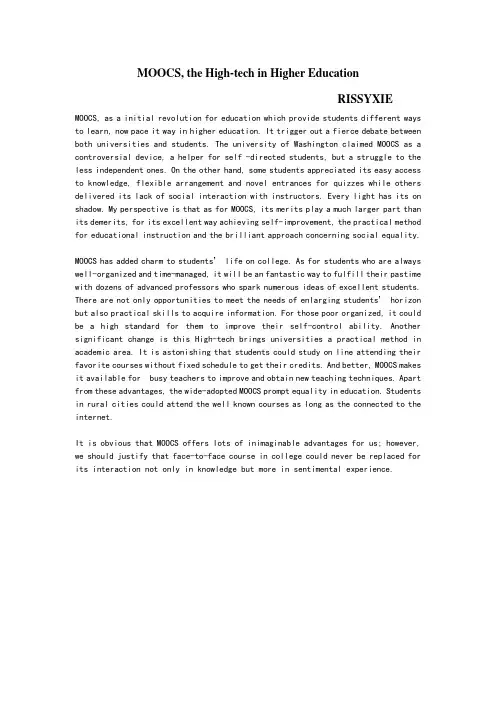
MOOCS, the High-tech in Higher EducationRISSYXIEMOOCS, as a initial revolution for education which provide students different ways to learn, now pace it way in higher education. It trigger out a fierce debate between both universities and students. The university of Washington claimed MOOCS as a controversial device, a helper for self -directed students, but a struggle to the less independent ones. On the other hand, some students appreciated its easy access to knowledge, flexible arrangement and novel entrances for quizzes while others delivered its lack of social interaction with instructors. Every light has its on shadow. My perspective is that as for MOOCS, its merits play a much larger part than its demerits, for its excellent way achieving self-improvement, the practical method for educational instruction and the brilliant approach concerning social equality.MOOCS has added charm to students’life on college. As for students who are always well-organized and time-managed, it will be an fantastic way to fulfill their pastime with dozens of advanced professors who spark numerous ideas of excellent students. There are not only opportunities to meet the needs of enlarging students’horizon but also practical skills to acquire information. For those poor organized, it could be a high standard for them to improve their self-control ability. Another significant change is this High-tech brings universities a practical method in academic area. It is astonishing that students could study on line attending their favorite courses without fixed schedule to get their credits. And better, MOOCS makes it available for busy teachers to improve and obtain new teaching techniques. Apart from these advantages, the wide-adopted MOOCS prompt equality in education. Students in rural cities could attend the well known courses as long as the connected to the internet.It is obvious that MOOCS offers lots of inimaginable advantages for us; however, we should justify that face-to-face course in college could never be replaced for its interaction not only in knowledge but more in sentimental experience.。
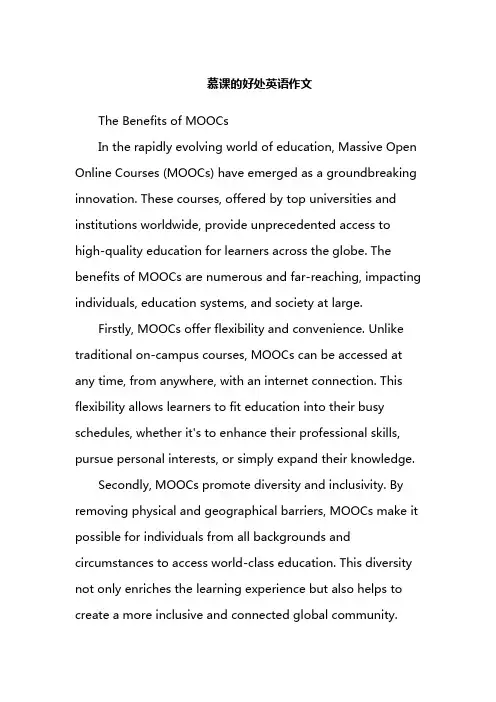
慕课的好处英语作文The Benefits of MOOCsIn the rapidly evolving world of education, Massive Open Online Courses (MOOCs) have emerged as a groundbreaking innovation. These courses, offered by top universities and institutions worldwide, provide unprecedented access to high-quality education for learners across the globe. The benefits of MOOCs are numerous and far-reaching, impacting individuals, education systems, and society at large.Firstly, MOOCs offer flexibility and convenience. Unlike traditional on-campus courses, MOOCs can be accessed at any time, from anywhere, with an internet connection. This flexibility allows learners to fit education into their busy schedules, whether it's to enhance their professional skills, pursue personal interests, or simply expand their knowledge.Secondly, MOOCs promote diversity and inclusivity. By removing physical and geographical barriers, MOOCs make it possible for individuals from all backgrounds and circumstances to access world-class education. This diversity not only enriches the learning experience but also helps to create a more inclusive and connected global community.Thirdly, MOOCs provide a platform for collaboration and networking. Many MOOCs include interactive features such as forums, wikis, and project-based learning, which encourage learners to engage with each other, collaborate on projects, and build professional networks. These connections can lead to new opportunities, collaborations, and even friendships.Moreover, MOOCs are often free or low-cost, making them accessible to a wide range of learners, regardless of their financial situation. This affordability not only democratizes access to education but also helps to reduce the financial burden on individuals and families.In addition, MOOCs can enhance career opportunities. By providing professional development and skills training, MOOCs help learners to stay competitive in today's rapidly changing job market. Whether it's learning a new programming language, improving communication skills, or gaining industry-specific knowledge, MOOCs can provide the necessary tools and qualifications to succeed in today's workforce.Finally, MOOCs contribute to the overall advancement of knowledge and research. By sharing expertise and research findings from top universities and institutions, MOOCs help todisseminate knowledge and advance the boundaries of academic research. This, in turn, benefits society at large by driving innovation, promoting economic growth, and addressing global challenges.In conclusion, MOOCs offer a unique and transformative opportunity for learners worldwide. By providing flexible, convenient, and affordable access to world-class education, MOOCs promote diversity, inclusivity, collaboration, and career advancement. As the impact of MOOCs continues to expand, it is clear that they will play a crucial role in shaping the future of education and society.。
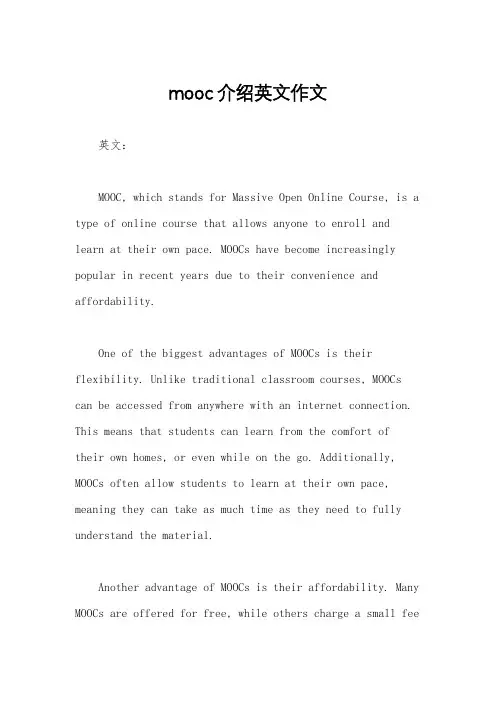
mooc介绍英文作文英文:MOOC, which stands for Massive Open Online Course, is a type of online course that allows anyone to enroll and learn at their own pace. MOOCs have become increasingly popular in recent years due to their convenience and affordability.One of the biggest advantages of MOOCs is their flexibility. Unlike traditional classroom courses, MOOCs can be accessed from anywhere with an internet connection. This means that students can learn from the comfort oftheir own homes, or even while on the go. Additionally, MOOCs often allow students to learn at their own pace, meaning they can take as much time as they need to fully understand the material.Another advantage of MOOCs is their affordability. Many MOOCs are offered for free, while others charge a small feefor a certificate of completion. This makes MOOCs a great option for those who may not have the financial means to attend a traditional college or university.However, there are also some drawbacks to MOOCs. One of the biggest challenges is the lack of interaction with instructors and fellow students. While some MOOCs offer discussion forums or virtual office hours, it can still be difficult to get personalized feedback or ask questions in real-time.Overall, MOOCs are a great option for those looking to further their education or learn new skills. They offer flexibility and affordability, making education more accessible to a wider range of individuals.中文:MOOC,即大规模开放在线课程,是一种允许任何人以自己的节奏注册和学习的在线课程。
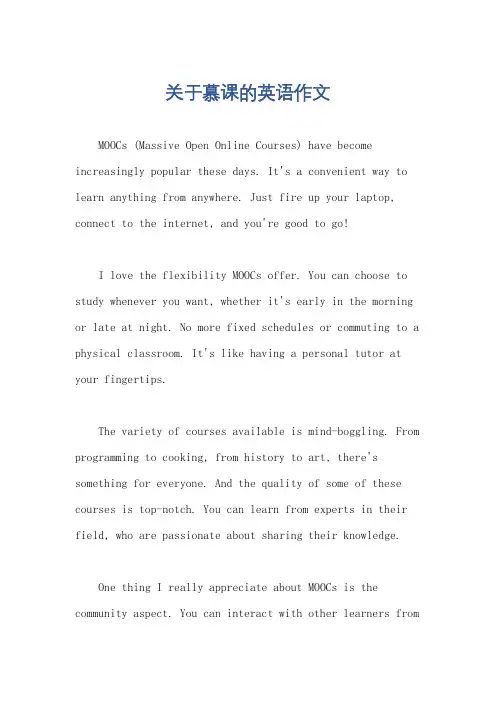
关于慕课的英语作文MOOCs (Massive Open Online Courses) have become increasingly popular these days. It's a convenient way to learn anything from anywhere. Just fire up your laptop, connect to the internet, and you're good to go!I love the flexibility MOOCs offer. You can choose to study whenever you want, whether it's early in the morning or late at night. No more fixed schedules or commuting to a physical classroom. It's like having a personal tutor at your fingertips.The variety of courses available is mind-boggling. From programming to cooking, from history to art, there's something for everyone. And the quality of some of these courses is top-notch. You can learn from experts in their field, who are passionate about sharing their knowledge.One thing I really appreciate about MOOCs is the community aspect. You can interact with other learners fromall over the world, discuss ideas, and share experiences.It's a great way to expand your network and meet people with similar interests.However, one downside is that MOOCs require a lot of self-motivation. Without a teacher or classmate to keep you accountable, it's easy to get distracted or lose interest. But if you're determined to learn, MOOCs can be a powerful tool to help you achieve your goals.In conclusion, MOOCs are a great way to learn newskills and expand your knowledge base. They offer flexibility, variety, and a chance to connect with people from all over the world. So why not give them a try? You might just find your new passion!。
谈谈对mooc的看法,学生,英文作文Online education has revolutionized the way we learn and access knowledge. One of the most significant developments in this field is the rise of Massive Open Online Courses (MOOCs). MOOCs have transformed the educational landscape by providing individuals around the world with the opportunity to access high-quality courses from renowned institutions and experts, often free of charge. As a student, I have had the privilege of experiencing the benefits and challenges of MOOCs, and I believe they hold immense potential for the future of education.One of the primary advantages of MOOCs is their accessibility. They have broken down geographical barriers, allowing students from diverse backgrounds and locations to participate in the same learning experiences. This democratization of education is particularly valuable for individuals who may not have the means or opportunity to attend traditional brick-and-mortar institutions. MOOCs offer a level playing field, where anyone with an internet connection can access a wealth of knowledge and resources.Another remarkable aspect of MOOCs is their scale. The term "massive" in the acronym reflects the ability of these courses to accommodate thousands, if not millions, of learners simultaneously. This scale allows for a diverse range of perspectives and experiences to be shared, enriching the learning process. In a traditional classroom setting, the number of students is often limited, but MOOCs can bring together a global community of learners, fostering a dynamic and engaging environment.Furthermore, MOOCs provide a flexibility that is unmatched in traditional educational models. Students can access course materials at their own pace, revisit content as needed, and fit their learning around their personal schedules. This flexibility is particularly beneficial for individuals who may have work or family commitments, or who live in remote areas where access to physical educational institutions is limited.One of the key strengths of MOOCs is the quality of the content and the expertise of the instructors. Many of the courses are developed and delivered by renowned universities and subject matter experts, ensuring a high standard of education. This access to top-tier educational resources is a significant advantage, as it allows students to learn from the best in their respective fields.However, the success of MOOCs is not without its challenges. One ofthe primary concerns is the high dropout rate among MOOC participants. Due to the lack of face-to-face interaction and the self-directed nature of the learning experience, some students may find it difficult to stay motivated and committed throughout the course. Addressing this challenge requires innovative strategies to foster a sense of community and accountability within the MOOC environment.Another issue is the assessment and credentialing of MOOC participants. While some MOOCs offer certificates or even academic credits upon completion, the recognition and value of these credentials are still being debated in the academic and professional communities. Establishing robust and widely accepted assessment methods and credentialing systems will be crucial for the long-term success and integration of MOOCs into the mainstream educational landscape.Despite these challenges, I believe that MOOCs have the potential to transform the way we approach education. They offer a unique opportunity to democratize learning, provide access to high-quality resources, and foster a global community of lifelong learners. As a student, I have personally benefited from the flexibility and diversity of MOOC offerings, allowing me to explore subjects and topics that may not have been available in my local educational institutions.Moreover, the rise of MOOCs has the potential to disrupt traditional educational models, pushing institutions to reevaluate their teaching methods and adapt to the evolving needs of students. This could lead to more personalized and engaging learning experiences, better integration of technology, and a more collaborative approach to education.In conclusion, MOOCs represent a significant advancement in the field of education, offering unprecedented access to knowledge and resources. While there are challenges to be addressed, the potential benefits of these online courses are vast and far-reaching. As a student, I am excited to see how MOOCs continue to evolve and contribute to the ongoing transformation of the educational landscape. By embracing the opportunities presented by MOOCs, we can work towards a more inclusive, accessible, and enriching educational experience for all.。
mooc英语作文In the digital age, Massive Open Online Courses (MOOCs) have revolutionized the way we approach education, particularly in the realm of language learning. English, being the lingua franca of the global community, has seen a significant shift in its teaching methodologies due to the advent of MOOCs. This essay will explore the impact of MOOCs on English learning, discussing their accessibility, flexibility, and the challenges they present.Firstly, the accessibility of MOOCs is unparalleled. Students from all corners of the globe can access high-quality English courses without the constraints of geographical location or financial barriers. This democratization of education has enabled learners to enhance their English proficiency attheir own pace and according to their own schedules.Secondly, the flexibility of MOOCs is a significant advantage for non-traditional students, such as working professionals or those with family commitments. English learners can engage with course materials 24/7, allowing them to study during their free time, without the need to disrupt their daily routines. This flexibility also extends to the ability to pause, repeat, or skip content, ensuring that learners can focus on areas where they need the most improvement.However, despite these benefits, MOOCs also present certain challenges. One of the primary issues is the lack ofpersonalized feedback. In a traditional classroom setting, students receive immediate feedback from teachers, which is crucial for language acquisition. MOOCs, being largely self-directed, may not provide the same level of interaction and personalized correction, which could hinder the learning process for some students.Another challenge is the potential for lower motivation levels. The absence of a structured classroom environment and peer interaction can make it difficult for some learners to stay motivated and committed to their English studies. This can lead to a higher dropout rate compared to moretraditional learning methods.In conclusion, MOOCs have significantly impacted English learning by providing a more accessible and flexible platform for education. While they offer many advantages, they also present challenges that need to be addressed to enhance the learning experience. As technology continues to evolve, it is likely that MOOCs will continue to adapt and improve,offering even greater benefits to English learners worldwide.。
mooc意思英文作文MOOC stands for Massive Open Online Course, which is a type of online course aimed at unlimited participation and open access via the web. It allows people from all over the world to learn new skills and knowledge without the constraints of time or location.MOOCs have gained popularity in recent years due to their flexibility and accessibility. People can learn at their own pace, from the comfort of their own homes, without the need to attend traditional classroom settings.One of the main advantages of MOOCs is the wide range of topics and courses available. From computer programming to photography, there is something for everyone. This diversity allows individuals to explore new interests and develop new skills in a convenient and cost-effective way.MOOCs also provide a platform for collaboration and networking. Students can interact with instructors andfellow learners through online forums and discussion boards, creating a sense of community and support that enhances the learning experience.Despite the many benefits of MOOCs, there are also challenges. Some people struggle with the lack of structure and motivation that comes with self-paced learning. Without the accountability of regular deadlines and assessments, it can be easy to fall behind or lose interest.Overall, MOOCs have revolutionized the way we learn and have made education more accessible to people around the world. Whether you're looking to advance your career or simply explore a new hobby, there is a MOOC out there for you.。
mooc学术英语写作In the digital age, MOOCs have become a gateway for learners to access academic English writing skills from the comfort of their homes. These online courses offer a flexible learning environment, where students can develop theirwriting abilities at their own pace.MOOCs provide a plethora of resources, including video lectures, reading materials, and interactive forums, which are instrumental in enhancing academic writing proficiency. The peer-review system in these courses allows students to receive constructive feedback, fostering a culture of continuous improvement.One of the key advantages of MOOCs for academic writing is the diversity of topics covered. From scientific research to humanities, learners can tailor their writing skills to a variety of disciplines, ensuring a well-rounded education.Moreover, MOOCs often feature assignments that simulate real-world academic writing tasks, such as drafting research papers and creating literature reviews. This practical approach prepares students for the rigors of scholarly writing.The self-paced nature of MOOCs also means that learners can revisit lessons and refine their writing as needed. This flexibility is particularly beneficial for those who wish topolish their skills over time.Despite the convenience, MOOCs require a high level of self-motivation and discipline. Students must be proactive in setting goals and deadlines to ensure they make the most of the course material.In conclusion, MOOCs offer a valuable platform for individuals seeking to improve their academic English writing skills. With the right approach and dedication, these courses can be a stepping stone to academic success.。
关于mooc英文作文MOOC, which stands for Massive Open Online Course, has become increasingly popular in recent years. It allows people to access high-quality education from top universities and institutions around the world without having to leave their homes. 。
The flexibility of MOOCs is one of their biggest advantages. Learners can study at their own pace, fitting their education around their work and personal commitments. This makes it easier for people to access education and improve their skills, regardless of their circumstances.Another benefit of MOOCs is the variety of courses available. Whether you're interested in computer science, history, or even cooking, there's a MOOC out there for you. This diversity allows learners to explore new subjects and gain knowledge in areas they may not have had access to before.MOOCs also provide a sense of community for learners. Through forums, discussion boards, and group projects, students can connect with others who share their interests and goals. This sense of belonging can be motivating and help learners stay engaged with their studies.One potential drawback of MOOCs is the lack of personal interaction with instructors. While some courses offer opportunities for one-on-one communication, the majority of learning is done independently. This can make it difficult for some students to stay motivated and focused.Despite this, MOOCs have the potential to revolutionize education and provide opportunities for people all over the world. With their flexibility, variety, and sense of community, MOOCs are changing the way we learn and opening up new possibilities for education.。
mooc的英文作文Taking a MOOC is a great way to learn new skills and expand your knowledge. You can study at your own pace and fit it around your schedule. Plus, there are so many different courses to choose from, so you can find something that really interests you.MOOCs are also a good way to connect with people from all over the world. You can join discussion forums and chat with other students, sharing ideas and learning from each other. It's a great way to build a network of like-minded people.One of the best things about MOOCs is that they are often free or very affordable. This means that anyone, no matter their background or financial situation, can access high-quality education. It's a real game-changer for education.Of course, taking a MOOC also requires a lot of self-discipline. It can be easy to procrastinate when you don't have set class times or deadlines, so you need to be motivated and dedicated to keep up with the work.Overall, MOOCs are a fantastic resource for anyone looking to learn new things. They're flexible, diverse, and accessible, making them a great option for lifelong learners.。
慕课英文写作中英对照Everyone’s going MOOC-crazy these days. From frequent media coverage of online courses and platforms like Coursera, edX, Udacity, and Udemy to discussions about the complexities and business models of online education, the excitement around MOOCs (Massive Open Online Courses) has finally “bubbled”over.在最近的这些日子里,MOOC 让每个人为之疯狂。
在媒体对在线课程及诸如Coursera, edX, Udacity, Udemy 这些平台的大规模报道,以及关于其复杂性和商业模式的各种讨论之后,围绕MOOC 的各种兴奋终于归于平静。
The question is not just whether MOOCs are going to disrupt traditional education, but how. Is it just about lower costs and access? Is it really going to be aNapster-like moment with entrenched “Teamsters in tweed”worried about the erosion of their research, publishing, and teaching?但当前的问题已不是MOOC 是否会颠覆传统教育,而是会如何颠覆传统教育。
难道MOOC 的优势仅在于更低的成本和更便捷的学习渠道?MOOC 真会如某些老顽固所言,侵蚀他们的研究、出版和教学活动,造就诸如当年Napster颠覆音乐行业的时刻?This is where we can leave the realm of hype and commentary to draw on our own years of research into disruption theory. Because the curious thing about the MOOC wave of disruption is that the market leaders —not just upstarts from the edges —are the ones pioneering it. And that rarely happens.在关于MOOC 的各种炒作和评论之外,我们得以分享我们自己就颠覆性创新的多年研究。
因为,这一波由MOOC 掀起的颠覆式浪潮中有一点足让人好奇,即那些处于市场中心的既得利益者,而不仅仅是那些处于市场边缘的创业团队,在率先引导(制造)这样一个变革,而这种情况,此前很少发生。
But First: Are MOOCs Really ‘Disruptive’?Yes, the word “disrupt”is overused. But it has a specific meaning when we’re talking about it. And MOOCs do bear the early hallmarks of a disruptive innovation: 首先,MOOC果真在“颠覆”吗?没错,“颠覆”这个词已经被用烂了。
不过,这个被用烂的词背后实际有其指代,我们说MOOC 是颠覆式的,也确实名正言顺,原因有三:Serves non-consumers. MOOCs are limited in the services they provide compared to traditional colleges, yet at the same time they are free and more accessible —which allows them to serve those who couldn’t otherwise access traditional higher education. Similarly, Toyota’s early cars didn’t match the reliability of Detroit’s automobiles. But they were more affordable and convenient, so the company first served people (“non-consumers”) for whom the alternative was, quite literally, nothing.1.非目标客户终于被包括进来:跟传统高校的服务相比,MOOC 确有很多不足之处。
但与此同时,MOOC 的各类课程却是免费的,而且也更容易获取——这就使得它们可以辐射到那些原本无福消受高等教育的一大群用户。
举个类似的例子,丰田早期的汽车就没有底特律各大公司产的可靠性那么强,但因为丰田的车子更便宜也更方便,所以这家公司第一次让那些非目标客户变成了目标客户——对这部分用户来说,几乎不存在其他公司提供的可行方案。
Marches upmarket. Instead of serving the same customers at the outset or competing head-on with established products, disruptive innovations improve over time to march upmarket. Eventually the quality becomes just good enough for the established customers to flock to it. It’s worth noting that the upmarket march is enabled by some key technology —such as bandwidth, video quality, online sharing tools, etc. —which is why MOOCs may now be having their moment, even though they’ve been around for years.2.逐渐向中高端市场挺进:颠覆性创新往往不是一开始上来就跟既得利益者抢客户、与其正面较量,而是随着时间的推进不断优化,逐渐挺进中高端市场。
但最终,颠覆性产品的性能会达到足够好,让市场中既有的客户乖乖奔向他们。
不过需要注意的一点是,实现上述这种情况往往有赖于某些核心技术的成熟——比如说带宽、视频质量、在线分享工具的保障等——这些都是MOOC 现在崛起的原因,尽管它们已经存在了数年。
Redefines quality. Eventually, the disruptive innovation changes the very definition of quality in a marketplace. In the current university system, for example, most faculty are rewarded for the quality of their research —not for the quality of their teaching. But the medium and scale changes things; in the future, courses might be offered based on employer demand, not faculty research interests. MOOCs are already evolving in some ways away from traditional educational constraints: Udacity’s courses, for example, have shifted from a time-controlled to a morecompetency-based learning model that takes advantage of the online medium.3.重新定义什么叫好:最终,颠覆性创新会改变整个市场对于“品质”的定义。
在现有的大学体系下,举个例子,大部分教师的评级标准都是基于他们的学术研究质量——而非他们的教学质量。
但是,互联网媒介和规模化将开启新的变革。
在未来,提供哪些课程将取决于雇主(这里指付费的学生),而非教师的研究兴趣。
目前,MOOC 已经在几个方向上摆脱传统教育束缚逐渐演变:举个例子,Udacity 的课程就开始发挥在线媒介的优势,从一个基于时间控制的学习模式转向一个基于个人能力的学习模式(按学生的掌握情况而非简单地依照学时推进课程)。
Does Who Is Doing the Disrupting Matter?Given the above criteria, it’s unusual, and remarkably difficult, for established market leaders to pioneer —or even catch up —with disruptions.到底谁在牵头搞颠覆,这事重要吗?基于上述的三个标准,让市场中固有的既得利益者做变革的先驱者,甚至说是赶上颠覆的节奏,这种情况不但不常见,而且困难重重。
Yet interestingly, the big, reputable universities are the ones leading the MOOC wave. This includes MIT and Harvard (through edX) as well as Stanford, whose groundbreaking AI course morphed into Udacity (and whose professors independently founded Coursera).但很有意思的一点是,现在恰是那些牛哄哄的大学在引领这样一波变革浪潮,这其中就包括MIT 和哈佛(通过edX 的项目),以及斯坦福,后者的突破性人工智能课程逐渐演变成了今时的Udacity,而斯坦福的教授也自立门户,创建了Coursera。